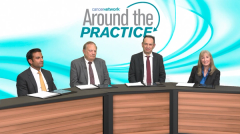
Patient Scenario 2: A Case of Relapsed HR+ Metastatic Breast Cancer
Expert perspectives review a case of relapsed HR+ metastatic breast cancer and consider treatment options available in the second line and beyond.
Episodes in this series

Transcript:
Jules Cohen, MD: Let’s go to clinical scenario No. 2. In December 2010, a 64-year-old woman with ER [estrogen receptor]–positive, PR [progesterone receptor]–negative, HER2 [human epidermal growth factor receptor 2]–negative invasive ductal carcinoma of the left breast received adjuvant anastrozole [Arimidex], presumably after all the appropriate surgical and other therapies. Seventeen months later, she presents with 3 small asymptomatic lesions of the left lung and mediastinal and hilar lymphadenopathy. She undergoes a biopsy, which confirms relapse disease: still ER positive, HER2 negative. She has a very good performance status and has received her course of CDK4/6 inhibitor and fulvestrant [Faslodex]. After a period of time, which is key, she presents with new lung and liver lesions.
Dr Slamon, what would you expect in terms of your routine patient with first-line metastatic disease, who is ER positive and on fulvestrant and CDK4/6? How long would they be able to be on that medication? What would their progression look like? What would you start thinking about for second-line therapy?
Dennis J. Slamon, MD, PhD: The second-line therapy might be guided by what we had in terms of molecular analyses on the tumor. If this patient had a PI3 kinase mutation, that would enter into my considerations for something in a salvage regimen, which includes alpelisib [Piqray]. Everolimus [Afinitor] is another option if you have or suspect a PI3 kinase-driven tumor. It’s challenging to give in my experience, and my colleagues say the same thing. In a sense, there are a lot of adverse effects to manage with everolimus, but they’re manageable. Either of those 2 are options for patients who progress afterward, but the appropriate first-line treatment was given to this patient.
Jules Cohen, MD: Dr Mortimer, when do you test for a mutation in PI3 kinase?
Joanne Mortimer, MD, FACP, FASCO: I check it at relapse and often after they progressed again. One of the questions is: do you check it on the tumor? Do you do a liquid tumor biopsy? There are rapid autopsy data. There’s a lot of heterogeneity, and you have different mutations in the tumor, in both metastatic and primary disease. I tend to do serum testing rather than biopsies for PIK3. I do it again at relapse and at subsequent progression. If you find out that the patient has ESR1 mutations, you may not use an aromatase inhibitor in conjunction, so you want to get some guidance about not only what will work but also what might not.
Jules Cohen, MD: Do you prophylax patients with any particular medications when you put them on alpelisib? Do you wait to see if they develop adverse effects?
Joanne Mortimer, MD, FACP, FASCO: Giving alpelisib can be challenging. Our order set for alpelisib has an immediate consult with endocrinology. In the first 6 months that we started to use alpelisib, a number of patients went into DKA [diabetic keto-acidosis] at day 7, even though maximum glucose elevation is on day 15. We routinely start diabetic teaching the minute we start patients on alpelisib. The people who do it are diabetes educators. They don’t need to have a physician intervention, but we have them see a diabetes educator at the same time that we start alpelisib. We haven’t had anyone admitted for glucose problems since we initiated that program. We also have more people using alpelisib. It’s a pretty scary drug if you haven’t had experience with it because medical oncologists aren’t good endocrinologists outside the breast cancer endocrine suppression therapy. We aren’t trained to manage diabetes. This has turned out to be an effective strategy for us.
Jules Cohen, MD: There are PI3 kinase mutation-specific inhibitors in development that target the H1047x mutation and other common mutations in PI3 kinase. Do you think those inhibitors are likely to be successful and possibly demonstrate better efficacy and less toxicity than alpelisib?
Neil M. Iyengar, MD: Time will tell. For allele-specific PI3 kinase inhibitors in testing right now, the scientific rationale is the avoidance of hyperinsulinemia, hyperglycemia, and more targeted inhibition of PI3 kinase. I’m eager to see the efficacy data from that class. Going back to some of the important comments that Dr Mortimer was making, this is partly why I tend to advocate for tumor sequencing early on. We presented data at ASCO [American Society of Clinical Oncology Annual Meeting] that identified BMI [body mass index] and other metabolic parameters as predictors of worse hyperinsulinemia and hyperglycemia with alpelisib treatment. If your patient is a candidate for PI3 kinase inhibition with alpelisib early on, that’s a good opportunity to institute lifestyle modifications, such as some of the nutritional counseling and weight loss to reduce the metabolic risk. Then bring that patient onto alpelisib treatment, and hopefully they have a lower risk of some of these metabolic complications.
Jules Cohen, MD: This is not the FDA-approved indication. I prophylax with metformin [Glucophage] and Claritin [loratadine] because the incidence of ration hyperglycemia is so high, and metformin is generally a very well-tolerated drug.
Neil M. Iyengar, MD: That’s a fair strategy. We saw data from the METALLICA trial at San Antonio Breast Cancer Symposium that support using metformin for managing the hyperglycemia associated with alpelisib, although there are data that alpelisib eliminates the mechanism of action through which metformin is supposed to help the hyperglycemia. There are other ongoing trials in Europe and the United States that are testing other diabetes medications, like SGLT2 inhibitors. Plus, dietary approaches—ketogenic diets, low carbohydrate diets—as strategies can be offered to our patients to help combat metabolic dysfunction.
Transcript edited for clarity.
Newsletter
Stay up to date on recent advances in the multidisciplinary approach to cancer.







































